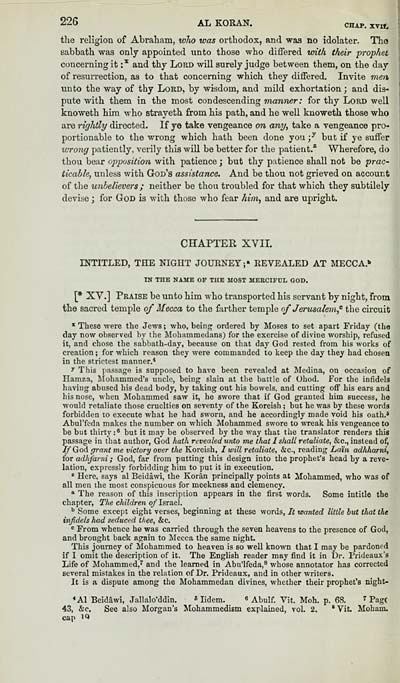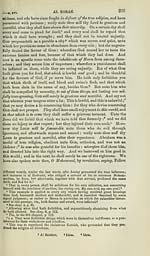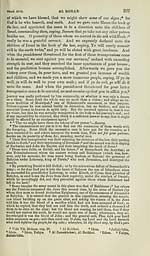Download files
Complete book:
Individual page:
Thumbnail gallery: Grid view | List view

226 AL KORAJT. CHAP, xyvl
the religion of Abraham, who was orthodox, and was no idolater. Tho
sabbath was only appointed unto those who differed with their prophet
concerning it :^ and thj Lord will surely judge between them, on the day
of resurrection, as to that concerning which they differed. Invite men
unto the way of thy Lord, by wisdom, and mild exhortation ; and dis-
pute with them in the most condescending manner: for thy Lord well
knoweth him who strayeth from his path, and he well knoweth those who
are rightly directed. If ye take vengeance on any, take a vengeance pro-
portionable to the wrong which hath been done you ;^ but if ye suffer
wrong patiently, verily this will be better for the patient.'' Wherefore, do
thou bear ojyposition with patience ; but thy patience shall not be prac-
ticable, unless with God's assistance. And be thou not grieved on account
of the unbelievers ; neither be thou troubled for that which they subtilely
devise ; for God is with those who fear him, and are upright.
CHAPTER XVIL
DITITLED, THE NIGHT JOURNEY;* REVEALED AT MECCA.»
IN THE KAME OF THE MOST MERCIFUL GOD.
[* XV.] Praise be unto him who transported his servant by night, from
the sacred temple of Mecca to the farther temple of Jerusalem,'' the circuit
* These were the Jews ; who, beinj^ ordered by Moses to set apart Friday (the
day now observed by the Mohammedans) for the exercise of divine worship, refused
it, and chose the sabbath-day, because on that day God rested from his works of
creation ; for which reason they were commanded to keep the day they had chosen
in the strictest manner.*
y This passage is supposed to have been revealed at Medina, on occasion of
Hamza, ]\Iohammed's uncle, being slain at the battle of Ohod. For the infidels
having abused his dead body, by taking out his bowels, and cutting off his ears and
his nose, when Mohammed saw it, he swore that if God granted him success, he
would retaliate those cruelties on seventy of the Koreish ; but he was by these words
forbidden to execute what he had sworn, and he accordingly made void his oath.*
Abul'feda makes the number on which Mohammed swore to \vreak his vengeance to
be but thirty:* but it may be observed by the way that the translator renders this
passage in that author, God hath revealed unto me that I shall retaliate, &c., instead of,
If God grant me victory over the Koreish, / will retaliate, &c., reading Lam adhharni,
for adhfarni; God, far from putting this design into the prophet's head by a reve-
lation, expressly forbidding him to put it in execution.
"^ Here, says al Beidawi, the Koran principally points at Mohammed, who was of
all men the most conspicuous for meekness and clemency.
» The reason of this inscripiion appears in the first words. Some intitle the
chapter, The children of IsTa.e\.
^ Some except eight verses, beginning at these words, /( wanted little but that the
infidels had seduced thee, &c.
« From whence he was carried through the seven heavens to the presence of God,
and brought back again to Mecca the same night.
This journey of Mohammed to heaven is so well known that I may be pardoned
if I omit the description of it. The English reader may find it in Dr. Prideaux's
Life of Mohammed,'^ and the learned in Abu'lfeda,^ whose annotator has corrected
several mistakes in the relation of Dr. Prideaux, and in other writers.
It is a dispute among the Mohammedan divines, whether their prophet's night-
«A1 Beidawi, Jallalo'ddin. « lidem. « Abulf. Vit. Moh. p. 68. ^ Pagc
43, &c. See also Morgan's Mohammedism explained, vol. 2. *Vit. Moham.
cap 1**
the religion of Abraham, who was orthodox, and was no idolater. Tho
sabbath was only appointed unto those who differed with their prophet
concerning it :^ and thj Lord will surely judge between them, on the day
of resurrection, as to that concerning which they differed. Invite men
unto the way of thy Lord, by wisdom, and mild exhortation ; and dis-
pute with them in the most condescending manner: for thy Lord well
knoweth him who strayeth from his path, and he well knoweth those who
are rightly directed. If ye take vengeance on any, take a vengeance pro-
portionable to the wrong which hath been done you ;^ but if ye suffer
wrong patiently, verily this will be better for the patient.'' Wherefore, do
thou bear ojyposition with patience ; but thy patience shall not be prac-
ticable, unless with God's assistance. And be thou not grieved on account
of the unbelievers ; neither be thou troubled for that which they subtilely
devise ; for God is with those who fear him, and are upright.
CHAPTER XVIL
DITITLED, THE NIGHT JOURNEY;* REVEALED AT MECCA.»
IN THE KAME OF THE MOST MERCIFUL GOD.
[* XV.] Praise be unto him who transported his servant by night, from
the sacred temple of Mecca to the farther temple of Jerusalem,'' the circuit
* These were the Jews ; who, beinj^ ordered by Moses to set apart Friday (the
day now observed by the Mohammedans) for the exercise of divine worship, refused
it, and chose the sabbath-day, because on that day God rested from his works of
creation ; for which reason they were commanded to keep the day they had chosen
in the strictest manner.*
y This passage is supposed to have been revealed at Medina, on occasion of
Hamza, ]\Iohammed's uncle, being slain at the battle of Ohod. For the infidels
having abused his dead body, by taking out his bowels, and cutting off his ears and
his nose, when Mohammed saw it, he swore that if God granted him success, he
would retaliate those cruelties on seventy of the Koreish ; but he was by these words
forbidden to execute what he had sworn, and he accordingly made void his oath.*
Abul'feda makes the number on which Mohammed swore to \vreak his vengeance to
be but thirty:* but it may be observed by the way that the translator renders this
passage in that author, God hath revealed unto me that I shall retaliate, &c., instead of,
If God grant me victory over the Koreish, / will retaliate, &c., reading Lam adhharni,
for adhfarni; God, far from putting this design into the prophet's head by a reve-
lation, expressly forbidding him to put it in execution.
"^ Here, says al Beidawi, the Koran principally points at Mohammed, who was of
all men the most conspicuous for meekness and clemency.
» The reason of this inscripiion appears in the first words. Some intitle the
chapter, The children of IsTa.e\.
^ Some except eight verses, beginning at these words, /( wanted little but that the
infidels had seduced thee, &c.
« From whence he was carried through the seven heavens to the presence of God,
and brought back again to Mecca the same night.
This journey of Mohammed to heaven is so well known that I may be pardoned
if I omit the description of it. The English reader may find it in Dr. Prideaux's
Life of Mohammed,'^ and the learned in Abu'lfeda,^ whose annotator has corrected
several mistakes in the relation of Dr. Prideaux, and in other writers.
It is a dispute among the Mohammedan divines, whether their prophet's night-
«A1 Beidawi, Jallalo'ddin. « lidem. « Abulf. Vit. Moh. p. 68. ^ Pagc
43, &c. See also Morgan's Mohammedism explained, vol. 2. *Vit. Moham.
cap 1**
Set display mode to: Large image | Transcription
Images and transcriptions on this page, including medium image downloads, may be used under the Creative Commons Attribution 4.0 International Licence unless otherwise stated. ![]()
| Early Gaelic Book Collections > J. F. Campbell Collection > Koran: or, Alcoran of Mohammed > (380) |
|---|
| Permanent URL | https://digital.nls.uk/77138275 |
|---|
| Description | Volumes from a collection of 610 books rich in Highland folklore, Ossianic literature and other Celtic subjects. Many of the books annotated by John Francis Campbell of Islay, who assembled the collection. |
|---|
| Description | Selected items from five 'Special and Named Printed Collections'. Includes books in Gaelic and other Celtic languages, works about the Gaels, their languages, literature, culture and history. |
|---|

